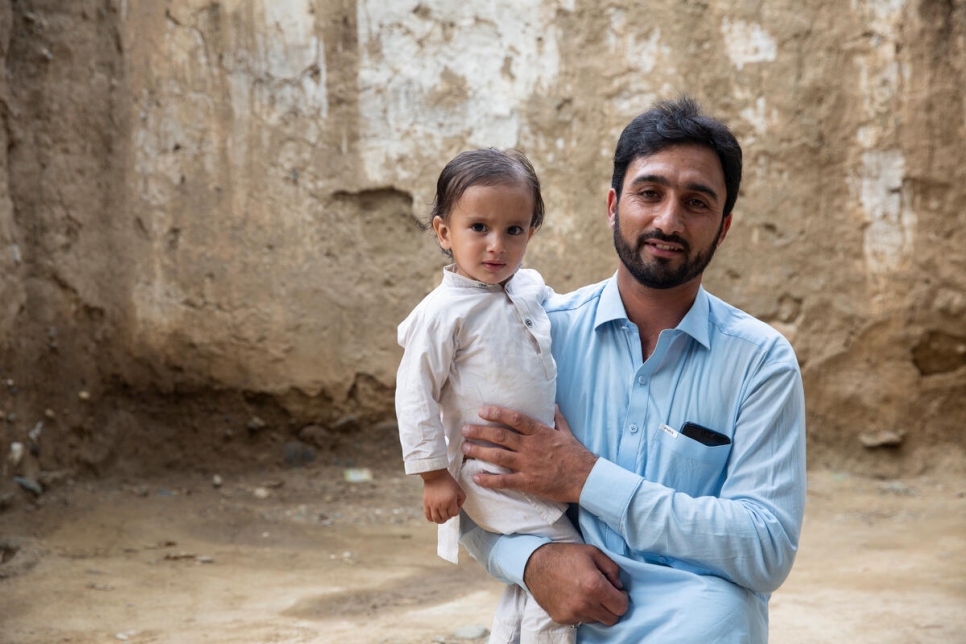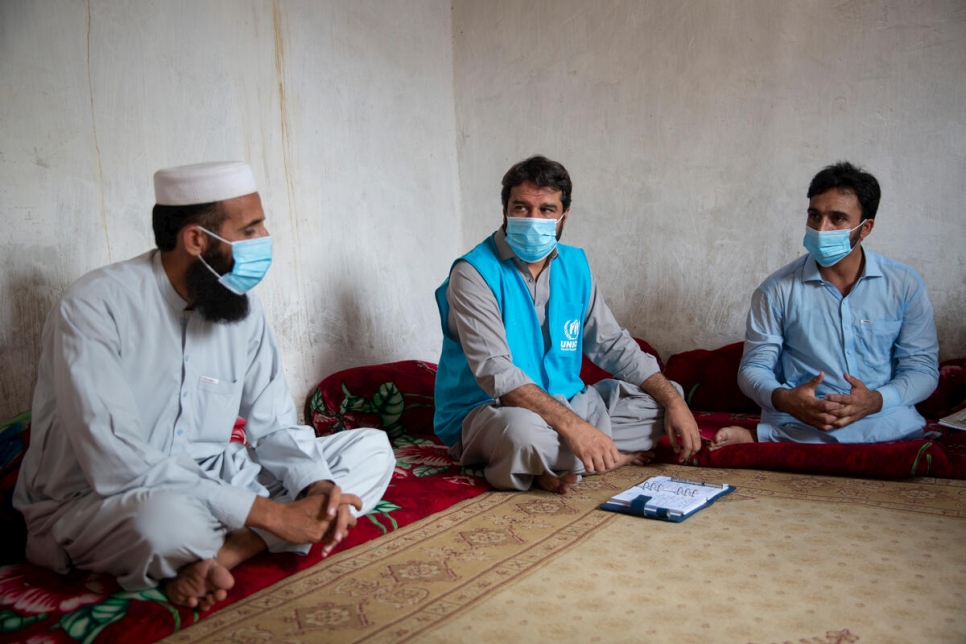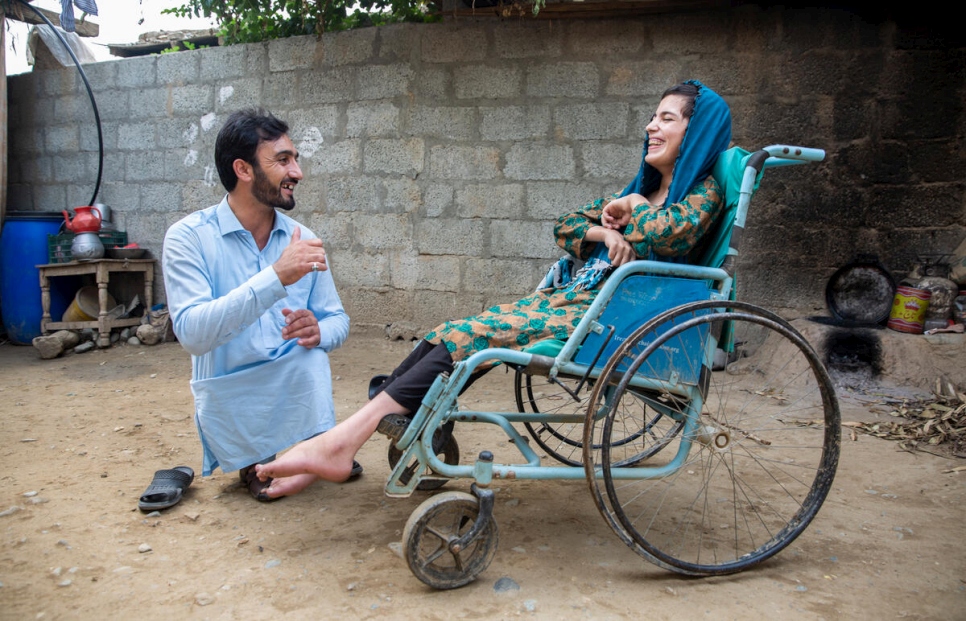Afghan refugee removes obstacles barring kids with disabilities from school
In Pakistan, Jamil provides wheelchairs to get refugees with disabilities into the classroom and give them a shot at a future.

Second-generation Afghan refugee Jamil ur Rehman, 33, and his son in Lower Dir, Pakistan. © UNHCR/Saiyna Bashir
A second-generation Afghan refugee, Jamil ur Rehman was born in Pakistan.
As a person with a disability as well as a refugee, he has confronted a series of obstacles in trying to get an education.
Entrenched community views on disability meant that he was actively prevented from attending school in his village in northwest Pakistan.
Neighbours in the Lower Dir district of Pakistan’s rugged Khyber Pakhtunkhwa province where he lived would say that he could never become a teacher or a soldier.
“No one thought I could do anything,” he says. “My parents were interested [in sending me to school], but some of the community elders put hurdles in the way – they said that I was disabled and couldn’t be educated.” Jamil knew better.
"I want to bring smiles to others' faces."
Now aged 33, he has dedicated his life to removing the multiple barriers that prevent refugees with disabilities from getting to school in Pakistan, and to changing attitudes about what they can achieve once in the classroom.
“Being disabled, I can understand the feelings people with disabilities have and the pain they experience,” he says. “I wanted to do something for others, forgetting my own disability. I want to bring smiles to others’ faces.”
Four years ago, Jamil founded the Afghan Refugee Disabled Union (ARDU) in Khyber Pakhtunkhwa, which is home to many refugees who have left Afghanistan in the years since the onset of conflict in 1979 triggered a first wave of displacement.
With the support of the Afghan refugee community, the local Union has so far distributed 60 wheelchairs to youngsters living in refugee villages who need them to get to school and realize their potential.

Jamil (right), founded the Afghan Refugee Disabled Union to provide wheelchairs to local youngsters with disabilities. © UNHCR/Saiyna Bashir
“I don’t want any disabled person to feel that they cannot be happy or self-reliant,” Jamil says of his work. “They can do anything they want.”
An estimated 12 million people with disabilities have been forcibly displaced by persecution, violence and human rights violations worldwide, although surveys and assessments suggest the real number may be much higher.
They are often at higher risk of violence, discrimination, exploitation and abuse, and face barriers to access basic services. In addition, they are often excluded from education and the chance to work and earn a living.
- See also: COVID-19 pandemic deepens hardship for over 12 million forcibly displaced people with disabilities
“I began to realize more and more that education was important in order to be heard,” Jamil says. “If you are not educated, you cannot achieve anything in your life. No one will listen.”
He finally got the opportunity to learn how to read and write at age 12, with home-based literacy and numeracy support from Basic Education for Afghan Refugees, a local partner organization of UNHCR, the UN Refugee Agency.
With perseverance, he eventually gained entry to a local refugee village school, where he completed grade three at the age of 18. But like many of the children and youth in his village, that was the ceiling for formal learning opportunities.
“I completed what I could … But there was nothing else for me and no chance to do more.”

Jamil visits 16-year-old Gul Bibi, who was able to continue her education after he helped her secure a wheelchair. © UNHCR/Saiyna Bashir
As he continues with self-study – mathematics is a passion – he is pushing hard to get more refugees with disabilities into the classroom, and to challenge the low expectations of what they can achieve when they get there.
Among them is 16-year-old Gul Bibi*, a young refugee with disabilities. She previously relied on her parents to carry her to primary school each day, and nearly dropped out on several occasions, until Jamil worked with her family to get her a wheelchair.
“I started dreaming big when I came to know that brother Jamil is trying to help with my return to school, and is helping to get a wheelchair for my easy mobility,” she says.
Gul has since completed her primary education and can now move freely on her own. She is more confident and optimistic about her future and wants to become an advocate – like Jamil – for access to education for people with disabilities.
“Many children with disabilities have been turned away, giggled at, and met with doubt and anxiety. Others who have been enrolled in school are not getting satisfactory support to ensure that their education is meaningful for them,” she says.
"My disability is a strength."
Another recent wheelchair recipient helped by Jamil is seven-year-old Awais who has physical disabilities and had become too heavy for his father, Zakar Ullah, a daily labourer, to carry. He struggled to get to school, the shops, or hospital unaided.
“Jamil was always concerned for Awais and still visits him with sweets and his favourite cookies,” says Zakar Ullah. “Awais can now move and go to the playground and enjoy nature with very little support from me.”
UNHCR supports Jamil in his trailblazing work. The Agency is also working with the government to expand educational opportunities for the 1.4 million Afghan refugees living in Pakistan, including those with disabilities.
For his part, Jamil continues to advocate for additional support for Afghan refugee children in his village. And he also wants his own community to recognize the value of education for all.
“Education has been important in making me who I am. My education is a strength. My disability is a strength,” he says. “I want my community to be positive. I want to empower other disabled community members, too. We are part of this world.”
*Name changed at refugee’s request.
